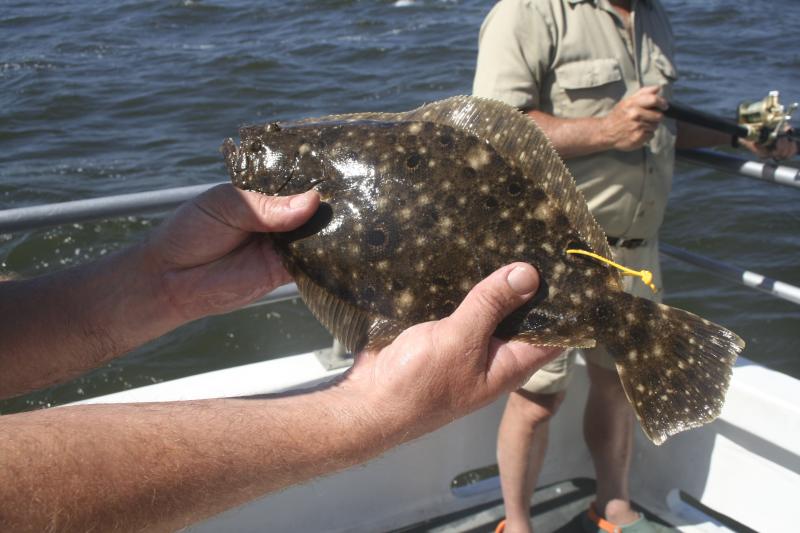Release fish as carefully as possible
With the heat of summer upon us and water and air temperatures at their highest, it is very important to take the utmost care when releasing fish that fall into a category the government says you are not allowed to keep. In Delaware Bay, the warm water is further degraded by the recent lack of rainfall that can drop the oxygen level and move the salt wedge farther up the bay.
Weakfish are very soft animal sand require very careful handling. I use a rag soaked in sea water to hold these fish while removing the hook, and then place the trout back in the water as gently as possible. If you find yourself in a school of small trout, under 13 inches, move away. The chances of catching a big weakfish from a school of little ones is remote.
Right now, big trout are found on structure such as the various rock walls, lighthouses, reef sites and shoals. Use live spot, big minnows, shrimp, bucktails or Gulp! on jigs. Last week, the Chasin’ Tail got six big trout from Delaware Bay while fishing out of Lewes.
Since the size limit increased to 17.5 inches, the number of flounder that have to be released has skyrocketed. Flounder are not the easiest fish to handle, but you have to do the best you can using a rag soaked in sea water. There a few companies that make fish grip tools. I have one and it does make holding fish with teeth, like flounder or bluefish, much easier to control. Do not touch the gills, even though the gill plates are an inviting handhold location. Here, too, hold the fish in the water until it feels strong enough to swim away on its own.
Just about every striped bass you catch is going to be released. We are now in the summer slot season in Delaware Bay with a one-fish bag limit and a 20- to 24-inch slot. In the ocean, the slot is 28 to 31 inches with a bag limit of one fish.
Large striped bass should not be removed from the water. Hold them under the body, remove the hook, and if you want a photo, have someone take it while you hold the fish and smile.
When you fish from a head boat, as I often do, you see many fish wasted. The size limit for black sea bass is 13 inches, and there are many fish caught that fail to measure up to that requirement. These fish float away from the boat to a waiting line of seagulls that dine on them at their pleasure.
As a member of the Advisory Council on Black Sea Bass, Scup and Summer Flounder, I have suggested lowering the size limit to 12 inches. The anglers would limit out sooner, there would be fewer fish for the seagulls and it would be a shorter day for the head boats. So far, my idea has fallen on deaf ears.
The reason the black sea bass float away is because their stomach is extended due to the difference in the water pressure from the bottom, 100 to 120 feet below the boat, to the surface. Given time, the stomach would deflate on its own, but due to the hungry seagulls, the fish are not given time for that to happen.
I read one article that recommended using a needle to puncture the air bladder before releasing the fish and another article that said that was a bad idea. After consulting with a marine biologist, I have decided to leave the process of puncturing the air bladder to those who are well trained in this procedure. There are release apparatus that will allow you to drop your fish to the bottom and then release them. I have only seen these on TV.
We are in the best part of the fishing season. People are catching fish everywhere, and as a result, they will be catching fish they can’t keep. Releasing those fish is important for the future of fishing in Delaware, and it will be part of our culture for many years to come. Please take the time to release the fish as carefully as possible. Use circle hooks to avoid deep hooking the fish, and return them to the water a quickly as possible.
There will always be release mortality, so our job is the keep that number as low as possible.






















































